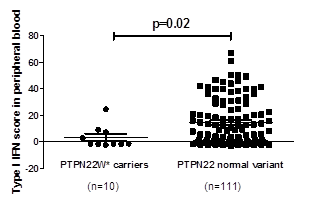Session Information
Date: Tuesday, November 10, 2015
Title: Sjögren's Syndrome: Translational Insights into Sjögren's Syndrome
Session Type: ACR Poster Session C
Session Time: 9:00AM-11:00AM
Background/Purpose: Protein tyrosine phosphatase
non-receptor 22 (PTPN22) gene encodes a protein tyrosine phosphatase previously
shown to inhibit antigen-receptor signaling in T cells and promoting type I
interferon (IFN) production by myeloid cells. PTPN22W* represents a single
nucleotide polymorphism (SNP), namely C1858T (rs 2476601),
which has been previously shown to increase susceptibility of various
autoimmune diseases including Type 1 Diabetes, SLE and RA. In regard to Sjögren’s Syndrome (SS), available data so far is
rather inconclusive. SS is a chronic autoimmune disease, with a prominent
peripheral type I IFN signature in approximately half of patients. In the
present study, we sought to explore whether the PTPN22W* risk variant would
influence the risk of primary SS in a Greek population and investigate
potential associations with clinical, laboratory features as well as type I IFN
scores in peripheral blood.
Methods: PTPN22W* was
identified with Real-Time PCR by TaqMan SNP
genotyping assay in peripheral blood DNA samples derived from 326 patients with
primary SS (91 SS-lymphoma and 235 SS non-lymphoma) according to the 2002
revised version of the European criteria proposed by the
American-European Consensus Group, as well as from 448 unrelated healthy
controls (HC) of similar age and sex distribution. Available peripheral blood
from 121 SS patients was subjected to Real-Time PCR for 3 interferon inducible
genes (IFIGs) preferentially induced by type I IFN and a type I IFN score was
determined. Clinical characteristics, demographics and laboratory
parameters were analyzed for possible associations with PTPN22W* using SPSS
21.0.
Results: Increased
prevalence of the PTPN22W* variant was detected in primary SS population
compared to HC [32/326, 9.8% vs 21/448, 4.7%, OR 95% (CI): 2.2 (1.3-3.9),
p-value: 0.006]. Of interest, the presence of the PTPN22W* variant was
associated with lower type I IFN scores in peripheral blood (Figure 1). After
we stratified primary SS patients into low and hi IFN subgroups, the
corresponding frequencies were 12.7% and 3.4%, respectively. PTPN22W* carriers
had a 3-fold increased risk for low-IFN SS development compared to HC [OR 95%
(CI): 3.0 (1.2-7.0), p=0.01]. No association with autoantibody status or
presence of lymphoma was observed.
Conclusion: PTPN22W* may be involved in SS genetic
predisposition implying an additional shared etiological origin in autoimmune
disorders. Association of PTPN22W* with low IFN scores in peripheral blood of
SS patients provides further evidence of the role of genetic contributors as
determinants of distinct IFN patterns in patients with autoimmune diseases.
Figure 1
To cite this abstract in AMA style:
Vlachogiannis N, Gkioka E, Nezos A, Mavragani C. Increased Frequency of the PTPN22W* Variant in Primary Sjögren’s Syndrome-Association with Low Type I IFN Scores in Peripheral Blood [abstract]. Arthritis Rheumatol. 2015; 67 (suppl 10). https://acrabstracts.org/abstract/increased-frequency-of-the-ptpn22w-variant-in-primary-sjogrens-syndrome-association-with-low-type-i-ifn-scores-in-peripheral-blood/. Accessed .« Back to 2015 ACR/ARHP Annual Meeting
ACR Meeting Abstracts - https://acrabstracts.org/abstract/increased-frequency-of-the-ptpn22w-variant-in-primary-sjogrens-syndrome-association-with-low-type-i-ifn-scores-in-peripheral-blood/

